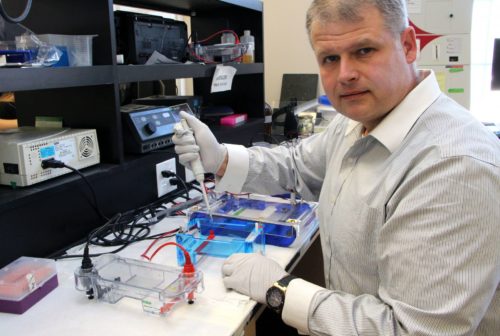This article is republished from The Conversation under a Creative Commons licence. Read the original article.
By Dr. Jim Petrik, Biomedical Sciences, Dr. Lauren Grant, Environmental and Public Health, Dr. Michelle Oblak, Soft Tissue and Oncologic Surgery and Dr. Shayan Sharif associate dean, Research and Graduate Studies
Our animal companions bring us joy and love us unconditionally. There is no question that our pet dogs and cats play an important role in our lives as companions.
But what might surprise people is that our pets may hold the key to a cure for human diseases, including cancer. Clinical studies of naturally occurring diseases in domesticated dogs and cats may fast track the development of therapies to the benefit of human and animal health.
New methods to tackle an insidious disease
Cancer is one of the leading causes of death worldwide, killing 230 Canadians each day. Traditionally, when a researcher develops a cancer therapy, it is first tested in lab-grown cancer cells to determine whether the treatment will have any effects against the tumour.
Next, the therapy is tested on mice by artificially inducing the disease and assessing the ability of the therapy to kill the cancer. If the therapy appears to work, it is then taken to human patients in an initial safety and efficacy trial.
We are becoming acutely aware that this approach is flawed. A staggering 94 per cent of cancer therapies developed using mice fail to show any clinical benefit in people. This failure means that sick people aren’t getting the effective treatments that they desperately need. People remain sick, and are dying, because we cannot treat them successfully.
Additionally, taking just one experimental therapy to clinical trials in people can cost millions of dollars. Most of this money comes from taxpayers in the form of government research funding. We need a sustainable and effective path forward.
Companion animals

The Ontario Veterinary College at the University of Guelph is home to a very busy Animal Cancer Centre that treats more than 5,000 companion animals for cancer annually. In contrast to the rodent models that we develop in the lab, companion animals like dogs and cats develop cancer spontaneously, just like humans.
Additionally, our pet dogs and cats live in the same environment that we do and are faced with the same environmental pressures, which may be why they experience a similar incidence of some types of cancer.
Genetic testing of tumours from companion animals has shown there is genetic diversity, like what is seen in humans, in contrast to the genetic homogeneity seen in mice. Our pet dogs and cats represent almost perfect models to investigate the effectiveness of new disease treatments.
We have an extremely talented team of cancer scientists, veterinary surgical oncologists and medical oncologists with tremendous experience conducting companion animal cancer clinical trials. In these trials, we treat pets with conventional cancer therapies, but we also use novel, cutting-edge therapies developed by our team. These include anti-cancer viruses, therapies to restrict blood flow to tumours and treatments to activate the immune system.
Identifying therapies

We have recently undertaken an aggressive initiative where we are partnering with cancer clinicians that treat people with cancer. With these partnerships, we can take a therapy from testing in cancer cells and mice to companion animal cancer trials, and ultimately to humans. This is known as translational research.
With translational research, we can identify and discontinue therapies that are unlikely to have a clinical benefit. This could dramatically reduce the high failure rate we are currently seeing in cancer therapies tested in people. For therapies that show promise, we can revise, refine and improve the therapeutic approach, both in the companion animal trials, and in preclinical rodent models.
Revised therapies can be further tested in companion animal trials, and then moved to human clinical trials. Our team can offer novel therapies that have been robustly tested and refined in preclinical trials and companion animal cancer patients.
Approaching a cure
A translational approach with companion animal models represents a shift in how we develop cancer therapies, and provides an exciting opportunity to develop effective therapies in both people and pets. And the promise of this approach extends beyond cancer to other conditions.
There are several other medical conditions that show a similarity of causes between humans and companion animals, such as osteoarthritis of the knee and hip and some psychiatric conditions such as obsessive-compulsive disorder.
From the kennel to a cure, translational research will change the landscape of disease therapy in Canada, and could dramatically improve the lives of Canadians and their pets.
